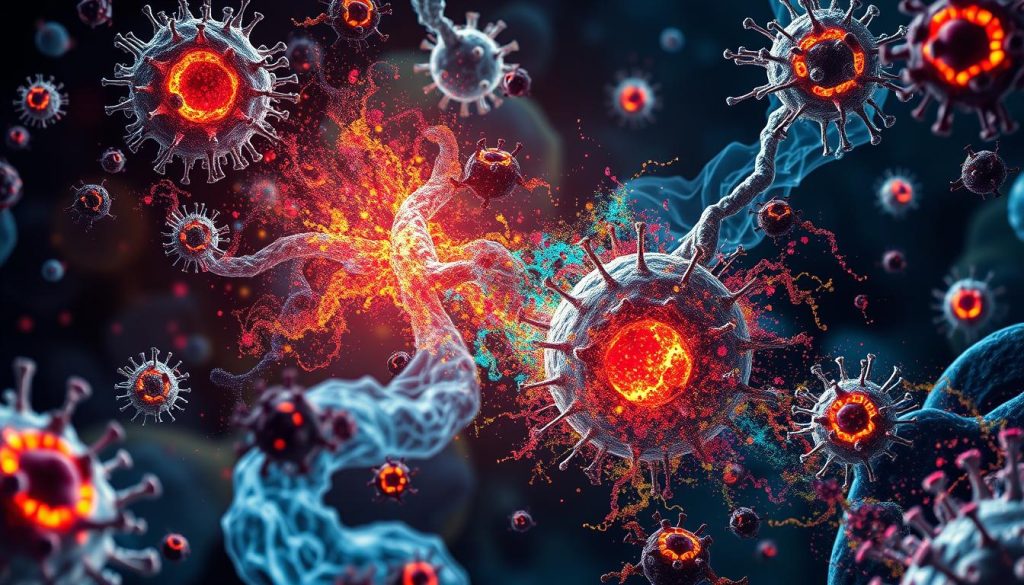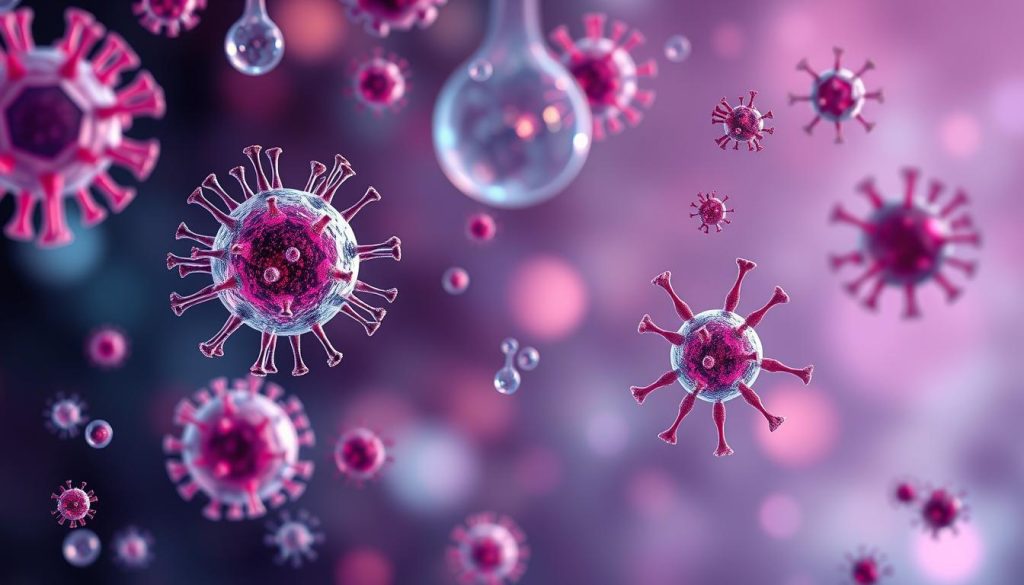When CAR T-cell therapy doesn’t work as hoped, patients and doctors face a big question. What if CAR T-cell therapy fails? This is a tough time that needs support and clear information. We aim to help by explaining what to do next, making sure everyone knows what’s coming.
Key Takeaways
- Exploration of potential courses of action post-CAR T-cell therapy failure.
- Support strategies and comprehensive guides for managing failed CAR T-cell therapy.
- Identifying signs that may indicate unsuccessful CAR T-cell treatment and what to do about them.
- Proactive planning for car t-cell therapy next steps, including novel treatment options.
- An understanding of the emotional and psychological support systems available for patients and families.
Understanding CAR T-Cell Therapy and Its Goals
CAR T-cell therapy is a new way to fight cancer. It uses the body’s immune system to find and kill cancer cells. This treatment is a hope for many with certain blood cancers.
The main goals are to make the treatment work better and to help patients get better. The therapy aims for remission, especially when other treatments have not worked.
The therapy starts with taking T-cells from the patient’s blood. These T-cells are then changed to recognize and attack cancer cells. This makes the treatment very personal, tailored to the patient and their cancer.
It’s important to watch how well the therapy works. Doctors look at how well the treatment is doing over time. They check things like how long the CAR T-cells stay active and how the patient is responding.
- Persistence of CAR T-cells: How long CAR T-cells stay active is key to success.
- Patient response: Doctors use tests and scans to see if the cancer is getting smaller.
- Side effects management: It’s important to quickly find and treat any bad reactions to keep the patient safe.
The goal of CAR T-cell therapy is to make life better and longer. It’s a hope for those with cancers that don’t respond to other treatments. As research goes on, the therapy is getting better and safer for more patients.
Common Reasons for CAR T-Cell Therapy Failure
Understanding CAR T-cell therapy is key to knowing why it fails in some patients. We look at three main reasons why this advanced cancer treatment doesn’t work for everyone.
Insufficient T-Cell Activation
In CAR T-cell therapy, it’s crucial to activate T-cells well for them to fight cancer. But, problems can occur if T-cells aren’t activated enough. This might be because of how cells are programmed, the patient’s immune system, or past treatments.
When T-cells aren’t activated well, the treatment doesn’t work as it should.
Tumor Cell Resistance
Tumor cells can also resist the therapy. Over time, they might change in ways that make them hard for CAR T-cells to target. This makes it tough for the treatment to work, leading to more challenges in fighting cancer.
Immune System Evasion
Cancer cells are smart at avoiding the immune system. They use tricks like making proteins that stop the immune response or changing their surface markers. This makes it harder for CAR T-cells to find and attack them, adding to the treatment’s challenges.

Understanding why CAR T-cell therapy fails is a complex task. It needs a team effort from doctors and researchers. They are working hard to find better ways to use CAR T-cell therapy and reduce its risks.
Signs and Diagnosis of CAR T-Cell Therapy Failure
Spotting car t-cell therapy relapse signs and knowing car t-cell therapy side effects is crucial. It helps doctors quickly change treatment plans. This ensures patient safety and better results. Let’s explore the symptoms of therapy failure and how doctors diagnose it.
- Persistent symptoms of the original cancer: If cancer symptoms don’t get better or get worse, it might mean a relapse.
- New health issues or unusual symptoms: If new symptoms pop up that don’t fit the patient’s history, it could be therapy side effects or complications.
- Elevated biomarkers: Lab tests showing high cancer markers after treatment can signal therapy failure.
Diagnosing CAR T-cell therapy relapse needs a detailed approach:
| Diagnostic Method | Utility |
|---|---|
| Imaging Tests | Help find cancer activity or changes in tumor size |
| Biopsy | Check for cancer cells after treatment |
| Blood Tests | Watch blood cell counts and cancer markers |
In summary, keeping a close eye on symptoms and regular tests are key. They help spot car t-cell therapy relapse quickly. Knowing car t-cell therapy side effects also helps doctors take care of patients better after treatment.
What Happens If CAR T-Cell Therapy Fails
If CAR T-cell therapy doesn’t work as hoped, there are steps to take. These include reevaluating the situation, talking openly about what to expect, and looking into alternatives to CAR T-cell therapy. It’s important for both patients and doctors to know the car t-cell therapy next steps. This helps manage hopes and plan for what comes next.

Knowing your options and what to do next can greatly affect your journey after therapy fails. Here’s a clear way to handle this tough situation:
- Comprehensive Reevaluation: Detailed medical checks are key to find out why the therapy didn’t work.
- Discussion of Prognosis: Talking openly about what might happen next is vital for patient readiness and making choices.
- Psychosocial Support: Helping with the emotional and mental side through counseling and support groups is crucial for staying strong.
| Treatment Option | Key Benefit | Consideration Factor |
|---|---|---|
| Bi-specific T-cell Engagers | Redirects T-cells to cancer cells | Suitable for certain blood cancers |
| Stem Cell Transplant | Can replace diseased cells with healthy ones | Dependent on donor availability and patient condition |
| New Generation Immunotherapies | Targets cancer with fewer side effects | Research and trials are still ongoing |
As cancer treatment keeps changing, it’s key to know about alternatives to CAR T-cell therapy and be ready for any outcome. Moving to new treatments and car t-cell therapy next steps should always aim to improve patient care and treatment results.
Immediate Steps After Therapy Failure
If CAR T-cell therapy doesn’t work as hoped, quick action is key. This is to tackle car t-cell therapy side effects and figure out what to do next. The first step is to carefully check the patient’s health and adjust the treatment plan if needed.
Comprehensive Evaluation and Testing
It’s important to understand why the therapy didn’t work. This involves using many diagnostic tools:
- Physical exams to spot any immediate problems
- Blood tests to check immune function and other important markers
- Advanced imaging to see how the disease is changing
These tests give a clear picture of the patient’s health. They help find any changes needed in the treatment.
Treatment Plan Modification
Based on the initial checks, the treatment plan might change. Options include:
- Adjusting dosages or schedules of current treatments
- Trying new therapies
- Getting ready for clinical trials of new treatments
These choices aim to improve treatment results and manage failed car t-cell therapy. The goal is to find the best treatment for the patient’s situation.
Also, ongoing monitoring is crucial. This is to quickly spot and handle any car t-cell therapy side effects. This is vital for keeping patients safe and improving treatment success.
When CAR T-cell therapy fails, it’s important to be alert and adapt to the patient’s changing needs. This ensures they get the best treatment options available.
| Assessment Tool | Purpose | Frequency |
|---|---|---|
| Physical Exam | Check for visible signs of side effects | Immediately post-therapy |
| Blood Test | Measure vital biomarkers | Weekly for the first month |
| Imaging | Monitor internal disease status | Monthly |
Alternatives to CAR T-Cell Therapy
When CAR T-cell therapy doesn’t work, finding alternatives to CAR T-cell therapy is key. These options help keep patient hope alive and move treatment forward. They also tackle some of the CAR T-cell therapy risks by offering different ways to fight cancer and fewer side effects.

The medical world is always looking for new treatments. They aim to find effective ways to fight cancer, even after CAR T-cell therapy fails. Let’s explore some promising treatments that could be the next step for patients.
Stem Cell Transplant
Stem cell transplantation is a tried-and-true treatment for those who’ve failed CAR T-cell therapy. It replaces bad bone marrow with healthy stem cells. This can help the body start over, especially if the cancer still responds to chemotherapy.
Bi-specific T-Cell Engagers
Bi-specific T-cell engagers are new proteins that guide T-cells to attack cancer cells. They offer a targeted approach, reducing the risks of broad immune system reactions seen with CAR T-cell therapy. This could lead to a more focused fight against cancer.
New Generation Immunotherapies
New immunotherapy treatments are being developed as alternatives to CAR T-cell therapy. These therapies aim to be more effective, less harmful, and work for different cancers. They focus on targeted treatments to reduce CAR T-cell therapy risks and improve patient results.
These alternatives bring new hope and expand treatment options beyond CAR T-cell therapy. They ensure patients have more choices in their battle against cancer.
Managing Failed CAR T-Cell Therapy
When CAR T-cell therapy doesn’t work as hoped, the focus turns to managing failed CAR T-cell therapy well. This involves a detailed plan to tackle both the physical and mental effects of treatment failure.
Handling CAR T-cell therapy complications is a key part of this. Doctors work quickly to ease symptoms and offer relief. They also adjust treatment plans to stop health from getting worse and manage any issues.
Long-term care and support are at the heart of managing these cases. Patients get regular check-ups and changes in their treatment to improve their life quality and tackle new health problems.
It’s also vital to support patients emotionally and mentally. Recovery and adjusting after therapy failure can be tough. Helping patients find counseling and support groups is key. For more on getting help, visit Healthwith support services.
| Aspect of Management | Action | Goal |
|---|---|---|
| Symptom management | Medication adjustments, physical therapy | Reduce discomfort and improve daily function |
| Emotional support | Counseling, patient communities | Build resilience and provide a community understanding |
| Long-term health monitoring | Regular clinical evaluations, updated treatment plans | Detect and manage long-term complications early |
In summary, managing failed CAR T-cell therapy needs a full plan. It must include medical, mental, and support steps. This approach tackles CAR T-cell therapy complications and looks after the patient’s overall health.
Psychological Impact of Therapy Failure
Treatment with CAR T-cell therapy comes with physical challenges and deep emotional effects when it fails. It’s vital to focus on the emotional health of patients during this time. This is key for their recovery and long-term well-being.

Counseling and Support Groups
Structured psychological support is very important. Patients who face the emotional toll of therapy failure find comfort in counseling and support groups. These places offer a space to share experiences, learn from others, and get help from professionals.
Strategies for Coping and Resilience
It’s crucial to build resilience when therapy fails. Patients are advised to try mindfulness, exercise, and hobbies that make them feel good. These activities help restore emotional balance and improve life quality after therapy.
Mental health experts stress the importance of family and community support. They make sure patients don’t face their feelings of disappointment or grief alone.
Understanding that setbacks are part of the journey and focusing on potential future successes can significantly alter the patient’s perspective towards therapy outcomes.
Risks and Complications After Failed Treatment
After CAR T-cell therapy fails, patients face many risks and complications. It’s important to know these risks to manage expectations and prepare for health challenges. This section talks about car t-cell therapy risks and car t-cell therapy complications. We’ll focus on infections, immune system issues, and the chance of second cancers.
Infections and Immune System Challenges
Failed CAR T-cell therapy can badly hurt a patient’s immune system. This makes them more likely to get infections that are hard to fight. Even small infections can be dangerous because of this.
Potential for Second Cancers
Another big worry is the chance of getting second cancers. The treatments for CAR T-cell therapy can sometimes cause genetic changes. This might raise the risk of getting other cancers. This is a key part of car t-cell therapy risks that needs watching and research.
| Complication | Short-term Effects | Long-term Effects |
|---|---|---|
| Infections | Increased illness frequency | Persistent vulnerability to infections |
| Secondary Cancers | Possible early signs post-therapy | Potential development of malignancies |
Dealing with these serious issues means watching closely and possibly getting more treatments. This helps manage the health risks from failed CAR T-cell therapy.
Research and Trials for Improved Treatments
There’s a lot of progress in cancer treatment. This is thanks to advanced research on car t-cell therapy response rates and car t-cell therapy next steps. These efforts aim to better patient outcomes through new trials and studies.
Research today is all about overcoming old therapy limits. It’s also about finding new treatments that could be game-changers. The mix of clinical science and tech advances keeps us moving forward. This brings hope and new chances for patients and doctors alike.
| Focus Area | Objective | Expected Outcome |
|---|---|---|
| Enhancing Efficacy | Improvement of CAR T-cell engineering | Higher response rates in diverse patient groups |
| Minimizing Relapse | Development of next-generation CAR T-cells | Reduced relapse rates and prolonged remission durations |
| Reducing Side Effects | Refinement of cell targeting capabilities | Better patient tolerance and fewer adverse effects |
This table shows the main areas of current research. It’s all about making CAR T-cell therapies better and safer. The goal is to boost car t-cell therapy response rates and prepare for future treatments.
Looking ahead, the future of car t-cell therapy next steps includes better treatments and care. We need to keep investing in clinical trials. This shows how crucial ongoing research and teamwork are.
Efficacy Rates and Statistics for CAR T-Cell Therapy
In the world of cancer treatment, looking at car t-cell therapy efficacy rates and car t-cell therapy statistics is key. It helps doctors and patients make informed choices. This part explores how well CAR T-cell therapy works and its place in cancer treatment.
Understanding the Success Metrics
When we talk about CAR T-cell therapy’s success, we look at survival rates, how long remission lasts, and how it improves quality of life. These numbers give a clear view of what patients can hope for with this new treatment.
Comparative Analysis with Other Treatments
- Comparative survival rates post-treatment
- Frequency and severity of side effects
- Cost-effectiveness of CAR T-cell therapy versus traditional therapies
| Treatment Type | 5-Year Survival Rate | Typical Side Effects |
|---|---|---|
| CAR T-Cell Therapy | 60% | Immune system reactions, cytokine release syndrome |
| Chemotherapy | 46% | Nausea, hair loss, nerve damage |
| Radiation Therapy | 72% (localized treatment) | Skin irritation, fatigue |
This comparison shows CAR T-cell therapy’s unique approach, especially for some cancers. But, it’s important to see how it works in real life. These numbers are more than just figures; they show the therapy’s potential to change lives.
Personalized Medicine and Custom Therapy Approaches
Personalized medicine is a big step forward in healthcare. It offers treatments that fit each person’s needs, especially in tough cases like managing failed CAR T-cell therapy. This method looks at each person’s health history and genes, avoiding treatments that don’t fit.
Personalized medicine focuses on custom therapy approaches. These are key when standard treatments don’t work. For example, in cancer, changing a treatment plan can greatly improve a patient’s life and chances of survival.

New technology and research help make treatments more precise. They let doctors figure out why some treatments fail and change the plan. This way, they can avoid failures and make treatments work better for each person.
Using genetic testing is a big part of personalized medicine. It helps doctors choose the best treatments for each person. This shows how custom therapy approaches are changing healthcare.
| Treatment Type | Application in Personalized Medicine | Benefits |
|---|---|---|
| Genetic Testing | Identifies patient-specific genetic variations to predict therapy outcomes | Enhances treatment accuracy, reduces adverse effects |
| Biomarker Analysis | Used to track the efficacy of customized treatments | Provides real-time data to fine-tune therapies |
| Revised Drug Formulations | Drugs tailored to individual metabolic profiles | Improves drug efficacy and minimizes toxicity |
As we learn more about personalized medicine, custom therapy approaches play a bigger role. They help in managing failed CAR T-cell therapy and change how we care for patients. Each person gets a treatment plan that’s just right for them.
Patient Narratives and Case Studies
In the world of medicine, especially with new treatments like CAR T-cell therapy, patient stories are very important. They show both the good and bad sides of treatment. This helps us see the whole picture, from success stories to cases where treatment didn’t work.
Success Stories After Initial Failure
Many patients face setbacks, but it doesn’t mean their journey ends. We look at real-life stories where CAR T-cell therapy worked after it first didn’t. These stories show that recovery is possible and highlight how doctors keep trying new ways to help.
Lessons Learned and Adaptive Strategies
Every patient’s story helps us learn and get better at CAR T-cell therapy. These stories show how doctors and patients work together to overcome challenges. They also show the strength and hope that patients and their families have during tough times.
Here are some key lessons and strategies from patient stories:
- Importance of Continuous Monitoring: Keeping a close eye on patients after treatment helps catch relapse early. This is key for quick action.
- Adaptation of Therapy Plans: Changing treatment plans based on how a patient responds can lead to better results on the next try.
- Emphasis on Holistic Care: Taking care of both the body and mind is crucial for healing.
These patient stories show how complex and changing CAR T-cell therapy is. They make each patient’s journey a part of growing medical science and treatment methods.
Conclusion
CAR T-cell therapy is a new way to fight some cancers. But, it doesn’t work for everyone. Knowing what happens if CAR T-cell therapy fails is key for patients and doctors. This article has covered why it might fail, what to do next, and other treatment options.
The outlook after CAR T-cell therapy failure is not hopeless. New research and trials offer hope for treatment. The emotional impact of failed therapy is big, but there’s support to help patients move forward.
In summary, CAR T-cell therapy comes with its challenges. But, the medical world keeps working to find better treatments. With personalized care and ongoing research, there’s always hope for patients. This journey shows the ongoing effort to heal and improve cancer care.
FAQ
Q: What happens if CAR T-cell therapy fails?
A: If CAR T-cell therapy fails, doctors will check why it didn’t work. They might do more tests or change the treatment plan. They also look for new trials or treatments.
Q: Are there alternatives to CAR T-cell therapy?
A: Yes, there are other treatments like stem cell transplants and new immunotherapies. The right choice depends on the patient’s health and cancer type. Doctors will decide based on these factors.
Q: What are the common reasons for CAR T-cell therapy failure?
A: Therapy can fail if T-cells don’t work well or if cancer cells resist. This shows how complex the battle between cancer and the immune system is.
Q: What are the risks and complications after failed CAR T-cell therapy?
A: Patients might get more infections or even second cancers. It’s important to watch for these risks and manage them well.
Q: How can you manage the psychological impact of therapy failure?
A: Seeking support and finding ways to cope are key. Counseling and support groups help a lot. Taking care of mental health is crucial.
Q: What immediate steps are taken after therapy failure?
A: First, doctors do a full check-up to understand why it failed. Then, they might change the treatment plan to better fit the patient.
Q: How are efficacy rates and statistics for CAR T-cell therapy used to inform treatment?
A: These numbers help doctors and patients see how well the therapy works. They compare it to other treatments to make better choices.
Q: How do personalized medicine and custom therapy approaches help after CAR T-cell therapy failure?
A: These methods tailor treatments to fit each patient’s needs. After failure, they help make new plans that might work better.
Q: Can you share any success stories after initial CAR T-cell therapy failure?
A: Many people have found new treatments that worked after CAR T-cell therapy failed. Their stories give hope and show that there’s always a chance for success.
Q: Is ongoing research being conducted to improve treatments after CAR T-cell therapy failure?
A: Yes, scientists are always working on new treatments. They aim to make CAR T-cell therapy better and find new ways to help patients.

















